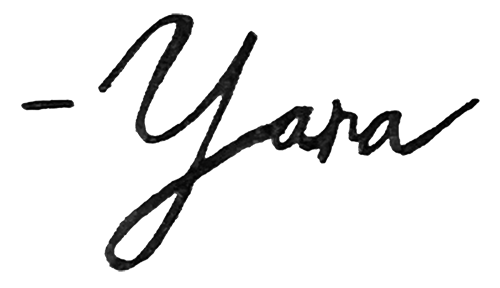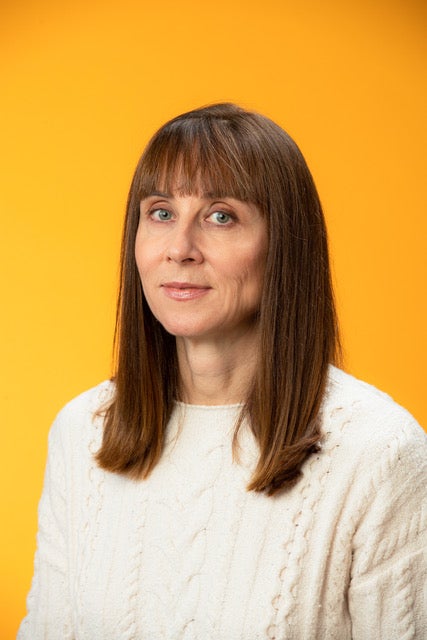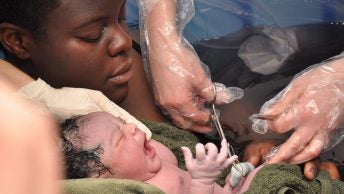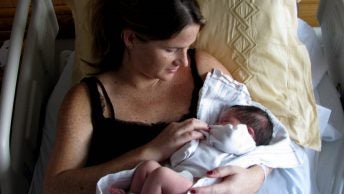Last month, I had the opportunity to have a conversation with Dr. Bettina Paek, a maternal-fetal medicine specialist and CEO of eDoula, an app that combines labor support content and increased access to tele doulas to support birthing people and their families. Dr. Paek founded eDoula and was inspired by TeamBirth, a project within the Delivery Decisions Initiative portfolio that aims to foster teamwork, communication, and empowerment of birthing people and their families. We delved deeper into the creation of eDoula, the role it plays in improving maternal health outcomes, and how COVID-19 has impacted the work being done at eDoula. Happy reading!

Yara: Can you start by telling me about eDoula and its mission to provide the best birth experience for everyone including families, doulas, and doctors/midwives?
Bettina: eDoula was inspired by the TeamBirth experience. I was one of the folks who brought the project to EvergreenHealth hospital and we applied to be one of the four initial pilot sites. What really struck me is that TeamBirth firmly plants the position of the birthing person, family and their support team as being an equal partner in their care. And it elevates the voice of a birthing person to where it should be. So instead of the more typical medical model, where the medical team are the experts this really positions the birthing family as the experts of what their goals are in the framework of medical care.
There are several aids that are part of Team Birth, including the labor support guide that outlines, “well, what can the team do for you? And what can you do for yourself to help enhance normal labor?” Penny Simkin came to the kickoff dinner to introduce Team Birth to our whole department. She demonstrated her amazing arsenal of tools for how families and their support persons can help birthing people enhance physiologic labor. And that’s where I had the idea, “oh my God, I need Penny in my pocket.” So that’s where the idea of eDoula, having an app that brings that to families, was born.
I was finishing an MBA at the time and I made that my capstone project. We had the opportunity of entering into a business plan competition and ended up winning the Grand Prize and so I used the Prize money to get going.
Penny and I created a video library of 50 labor support videos, that is now the core of the learning component of eDoula. But then we really wanted to take it a step further and say like, “well, you know, we really want people to have access to real life doulas.” I mean the app is great to teach yourself and your partner. But for some it is really helpful to also have personalized support. That way more birthing families will have access to doulas. Right now we have a concierge model of doula care where you either have a doula for your entire labor or you have no doula access at all. There really isn’t the option of saying, “my insurance can pay for some doula care”, or “I can have a doula when I most need one.” So you can’t drop in and out of doula care and make it more cost effective. You’re also limited by geography. You’re limited by the availability of doulas and of course, there’s the mismatch of how many doulas there are currently in the US and how many birthing people and families there are. And so we want to add more options to that, without replacing in-person doulas.
I think having someone by your side for the entire labor is always going to be best. But that’s just not feasible. There is just a minority of birthing families that have access to that right now. So we really wanted to expand access. And I think we all benefit from that, including birthing people. I think doulas benefit in terms of their profession being recognized. And I think we as medical care providers benefit as well. I love it when my patients have a doula because I know they’re going to be more resilient, they’re going to be more able to cope with the inevitable curveballs that are going to come their way, and I think they’re set up for having better outcomes.
Yara: How do you all coordinate those services for expecting mothers and their families?
Bettina: We’re a start up locally in Seattle, but our goal is to be utilized on a national scale. The beauty of having an e-doula is that you’re not really limited by geography. So you can be in one part of the country and your doula can be in a completely different part of the country and you’re going to be able to connect. I think it is really important that the doulas ideally be from the same communities as the clients that they serve – to have that baseline understanding of the challenges they might be facing. So I think there’s just more of an immediate connection there that is going to be super helpful, especially for minority communities. Access to doulas is really limited by cost and that selects out a lot of minority communities.
I think we are seeing a lot of interest from payers and foundations and nonprofits and even from Medicaid to expand access to doulas but they just haven’t figured out a way to make it work. So I really had to figure out like, “well, how do we get people access to doulas in a way that is financially sustainable and that connects them with their communities.?” And that’s where I think the e-doula model can really be helpful.
My hope would be that it would be nationally available and that we can connect doulas that are regionally remote, especially for rural areas where there aren’t a lot of doulas or the commutes might be really long for the doulas.
Yara: That’s great! In what way do you expect virtual doulas to advocate for their patients when they’re remote?
Bettina: Well, I think they really help the patient advocate for themselves or the partner advocate for the patient. They can be part of a Team Birth conversation. We’re hoping that the model of Team Birth communication expands where the persons who are in the room invite input from everyone including the support people and that would include a doula, whether present in person or virtual. We have done huddles remotely over the phone and it’s totally doable. And with COVID everyone has gotten so much more comfortable with virtual settings in addition to face to face interactions. But really the role of the doula is to help the birthing family have confidence in their own ability, confidence in their own voice, and be able to empower birthing people to speak up.
So I think they can advocate for birthing people even if they’re not there, and I don’t see this as advocating against the medical team. I think we all need to come together and have a conversation together. And that’s how Team Birth really transforms the conversations we have because it prepares the medical care team to know that this is a dialogue and not just a one way conversation, where I as the care provider lecture the birthing family saying like, “hey, this is what’s going on. This is what we should do. Any questions?” Because let’s be honest that is kind of the traditional model of where we tell a bit of a story. We do invite questions, but we’re not starting a conversation with, “where are you coming from? What’s important to you?” And then place the medical circumstances in the framework of that.
Yara: What are the gaps in how expectant families are cared for?
Bettina: This is such a large systemic problem. The biggest gap is that I think people feel like their voices aren’t being heard and I think that gap is even bigger for minority communities. And I think that’s just come into the spotlight more recently with the spotlight on police brutality against black communities and the outrage with the protests that all came from the fact that those communities feel like their voices aren’t being heard. And I think that translates into the medical setting as well. And then, of course, if you feel like your voice isn’t being heard, you don’t really have a lot of trust in the system. And I think all the downstream effects occur from there.
Yara: How do you think or envision eDoula to contribute to maternal and birth outcomes?
Bettina: What we really want to do is empower families to feel like they’re not just a passive recipient of care, but that they have the power to influence the outcomes. We want to give them tools to navigate this (e.g. instructional videos on how to prepare for birth, how to make the transition after birth easy, how to keep your birth team informed) so that they feel well prepared and so that a doula can use all of that as well and say, “I think this would be really helpful for you. And this is what I want you to think about. And this is how your partner can really help you.”
And then even if there’s something that we hadn’t anticipated, that just puts us in a position of being in the driver’s seat and saying, like, “look, I really have input in this.” And I think that’s how I want eDoula to make that mental frame shift from like, I’m helpless and this is all happening to me to I’m a participant in this happening in the world.
Yara: Yeah, and I think the past few blog posts we’ve published really focused on shared decision making and childbirth education, and I see a lot of that coming through the eDoula app. Are there any anecdotes you would like to share?
Bettina: We’ve gotten great feedback on our pilot product saying that it was more helpful than birthing classes just because birthing classes have a lot of content that comes at you all at once, which I think is a great foundation, but then it’s kind of hard to remember like “I have back pain but which one of the techniques was it? So really, then people are able to go back and say like, “oh, back pain, I’m going to search for back pain.” And here I have like a two minute video that shows me what my partner can do for back pain and all the different options I have that can help myself.
Yara: How has COVID impacted the work being done at eDoula?
Bettina: Well, I think it’s good and bad. The good news is that I think people have gotten a lot more comfortable with the virtual setting, and that the need for virtual solutions, I think, has been highlighted. You probably remember that outcry in New York, when initially they shut down to all support people, because they had had multiple staff members infected by support people and dads, leaving birthing people by themselves. And with the medical team we can’t be there 24/7 to provide support for them.
And the difficulty has been that we really want to add more content to it. We want to really diversify our content.. And that’s just been a little bit on hold. We’ve assembled a team, we have a videographer, we have birthing families, and we have doulas of color to kind of recreate to add content but we have to do it in a way that is safe for everyone. So I think it both helped highlight the need and hampered a little bit the progress on producing new content.
Yara: Is there anything else you would like to add to our conversation today?
Bettina: I know empowerment is such an overused term but behind it is such an important message. It needs to come from the birthing person and the care team needs to honor that.. And that’s really what we’re trying to bridge at eDoula. And I think what Team Birth is trying to do is really establish that there needs to be an agreement to meet as peers. And I think that’s so rewarding for both sides. And only good can come of that. So I think it’s just really important to keep amplifying that message. And it seems like such a simple tool, the whole Team Birth project, right? Oh, it’s just a whiteboard. But it’s the paradigm shift behind the whiteboard that’s really so crucial. That kind of flips the script a little bit.
One of my friends is a palliative care physician. And she was really instrumental in helping me reframe my own thinking, because the typical paradigm for medical discussion is “tell, ask, tell”. So you tell this is the situation. You ask “do you have any questions regarding the plan of care?” And then you kind of answer those questions. In palliative care it is the other way around. And it’s very much the team birth paradigm. It’s “ask, tell, ask”. Ask “where are you coming from? What was really important to you? What are your goals?” And then tell this is the situation in terms of what we see medically and then ask “well folding into your values, how do we want to move forward knowing what you know now?” And that seems like such a subtle shift. But it’s such a profound difference in how we approach things and really gives the power to the family to make their own medically informed decisions based on what their values are. And I think especially in obstetrics, we get so distracted by the sort of ‘shiny, obvious, this is what everyone would want’ outcome. We want to help the baby and we want to help the mom. We tend to forget that there’s other things that are really important to families, and that those are really worthwhile to explore and that they really inform how we approach things.
So I think just that simple switch to :ask, tell, ask”, really helped me and folding that into eDoula is what we’re really trying to have people feel comfortable telling their story at the beginning. I really want to encourage people to think about what their values and what their priorities are, especially as they’re building a new family because this is a transformative event where you’re changing from being a person to being a parent, or from being a couple to being a family.
Yara: Thank you for sharing.

Dr. Bettina Paek is a native of Germany, where she attended undergraduate and medical school at the Ludwig Maximilians University in Munich, Germany. She started her residency in Obstetrics and Gynecology at the University Hospital in Munich and trained in a collaborative system with midwives and physicians. She moved to San Francisco, CA to pursue a research Fellowship at UCSF’s Fetal Treatment Center. She subsequently completed her clinical training in Obstetrics and Gynecology and a Maternal Fetal Medicine Fellowship at the University of Washington Medical Center in Seattle, WA. For the past 14 years she has practiced as a Maternal Fetal Medicine Attending at EvergreenHealth and has served as the Chair for the Department of Women’s and Children’s for the last 5 years. As the Department Chair she became involved in quality improvement projects and felt there was need for reform of the current health care system. With her background experience of close collaboration with midwives she became passionate to adding labor support resources for all women. She completed the Leadership Executive MBA at Seattle University and created a labor support app that won the 2019 Seattle University business plan competition. She is the founder and CEO of eDoula, an app that combines labor support content and access to tele doulas to support the birthing person and family.


